

Catullus. Modern bust of Catullus on the Piazza Carducci in Sirmione.[1] Gaius Valerius Catullus ( kə-TUL-əs, Latin: [kaˈtʊllʊs]; c. 84 – c. 54 BCE) was a Latin poet of the late Roman Republic who wrote chiefly in the neoteric style of poetry, which is about personal life rather than classical heroes.
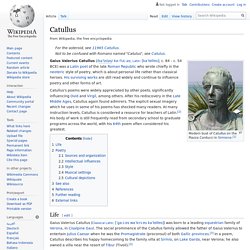
His surviving works are still read widely and continue to influence poetry and other forms of art. Catullus's poems were widely appreciated by other poets, significantly influencing Ovid and Virgil, among others. After his rediscovery in the Late Middle Ages, Catullus again found admirers. The explicit sexual imagery which he uses in some of his poems has shocked many readers. Latin poetry. We ask you, humbly, to help.
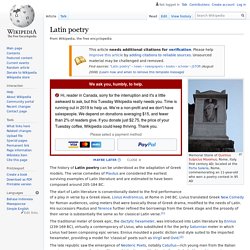
Hi, reader in Canada, sorry for the interruption and it's a little awkward to ask, but this Tuesday Wikipedia really needs you. Time is running out in 2019 to help us. We’re a non-profit and we don't have salespeople. We depend on donations averaging $15, and fewer than 2% of readers give. Roman Republic. Period of ancient Roman civilization (509–27 BC) The Roman Republic (Latin: Rēs pūblica Rōmāna, Classical Latin: [ˈreːs ˈpuːblɪka roːˈmaːna]) was the era of classical Roman civilization beginning with the overthrow of the Roman Kingdom, traditionally dated to 509 BC, and ending in 27 BC with the establishment of the Roman Empire.
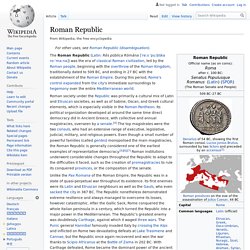
It was during this period that Rome's control expanded from the city's immediate surroundings to hegemony over the entire Mediterranean world. Ovid. Life[edit] Ovid talks more about his own life than most other Roman poets.
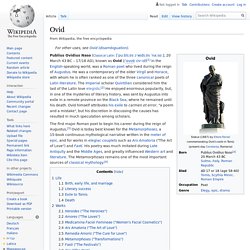
Information about his biography is drawn primarily from his poetry, especially Tristia 4.10, which gives a long autobiographical account of his life. Other sources include Seneca the Elder and Quintilian. Birth, early life, and marriage[edit] His father wanted him to study rhetoric toward the practice of law. Virgil. 1st-century BC Roman poet Virgil is traditionally ranked as one of Rome's greatest poets.
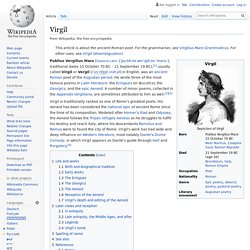
His Aeneid has been considered the national epic of ancient Rome since the time of its composition. Modeled after Homer's Iliad and Odyssey, the Aeneid follows the Trojan refugee Aeneas as he struggles to fulfill his destiny and reach Italy, where his descendants Romulus and Remus were to found the city of Rome. Virgil's work has had wide and deep influence on Western literature, most notably Dante's Divine Comedy, in which Virgil appears as Dante's guide through Hell and Purgatory.[4] Life and works[edit] Birth and biographical tradition[edit]
Late Middle Ages. Period of European history between 1250 and 1500 CE From the Apocalypse in a Biblia Pauperum illuminated at Erfurt around the time of the Great Famine.
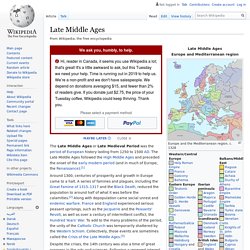
Death sits astride a lion whose long tail ends in a ball of flame (Hell). Famine points to her hungry mouth. The Late Middle Ages or Late Medieval Period was the period of European history lasting from 1250 to 1500 AD. Equestrian. The word equestrian is a reference to horseback riding, derived from Latin equester and equus, "horse".
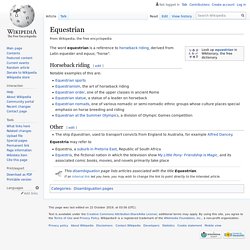
Horseback riding[edit] Notable examples of this are: Equestrian sportsEquestrianism, the art of horseback ridingEquestrian order, one of the upper classes in ancient RomeEquestrian statue, a statue of a leader on horsebackEquestrian nomads, one of various nomadic or semi-nomadic ethnic groups whose culture places special emphasis on horse breeding and ridingEquestrian at the Summer Olympics, a division of Olympic Games competition Other[edit] The ship Equestrian, used to transport convicts from England to Australia, for example Alfred Dancey. Equestria may refer to. Verona. Comune in Veneto, Italy Verona ( və-ROH-nə, Italian: [veˈroːna] ( listen); Venetian: Verona or Veròna; historical German: Bern, Welschbern, or Dietrichsbern) is a city on the Adige river in Veneto, Italy, with 258,108 inhabitants.
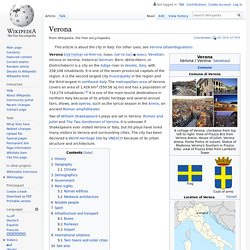
It is one of the seven provincial capitals of the region. It is the second largest city municipality in the region and the third largest in northeast Italy. Cisalpine Gaul. Map of Cisalpine Gaul, extending from Veneto on the Adriatic, to Pisa and Nice on the Mediterranean, to Lake Geneva in the west, and the Alps in the North, from Abraham Ortelius' Theatrum Orbis Terrarum, the first modern atlas of the world.
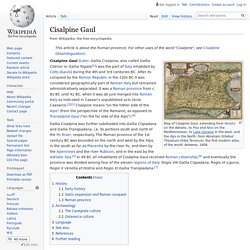
Antwerp, 1608. History[edit] Julius Caesar. Roman general and dictator Gaius Julius Caesar[a] ( SEE-zər, Latin: [ˈɡaːi.ʊs ˈjuːli.ʊs ˈkae̯.sar]; 12 July 100 BC – 15 March 44 BC) was a Roman general and statesman who played a critical role in the events that led to the demise of the Roman Republic and the rise of the Roman Empire. In 60 BC, Caesar, Crassus and Pompey formed the First Triumvirate, a political alliance that dominated Roman politics for several years.
Their attempts to amass power as Populares were opposed by the Optimates within the Roman Senate, among them Cato the Younger with the frequent support of Cicero. Promagistrate. Ancient Roman office In ancient Rome a promagistrate (Latin: pro magistratu) was an ex-consul or ex-praetor whose imperium (the power to command an army) was extended at the end of his annual term of office or later.
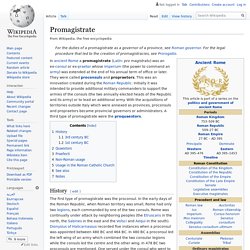
They were called proconsuls and propraetors. This was an innovation created during the Roman Republic. Gaul. We ask you, humbly, to help. Hi, reader in Canada, it seems you use Wikipedia a lot; that's great! It's a little awkward to ask, but this Tuesday we need your help. Time is running out in 2019 to help us. We’re a non-profit and we don't have salespeople. Roman province. Major Roman administrative territorial entity outside of Italy Roman Empire under Augustus (31 BC – AD 14).
Yellow: 31BC. dark green 31–19 BC, light green 19–9 BC, pale green 9–6 BC. mauve: client states The Roman empire under Hadrian (125) showing the provinces as then organised The Roman provinces (Latin: provincia, pl. provinciae) were the lands and people outside of Rome itself that were controlled by the Republic and later the Empire. Sirmio. We ask you, humbly, to help. Hi, reader in Canada, it seems you use Wikipedia a lot; that's great! It's a little awkward to ask, but this Tuesday we need your help.
Time is running out in 2019 to help us. We’re a non-profit and we don't have salespeople. We depend on donations averaging $15, and fewer than 2% of readers give. Thank you! Sirmio is a promontory at the southern end of Lake Garda,[1] projecting 3.3 kilometers (2.1 mi) into the lake. Lake Garda. We ask you, humbly, to help. Hi, reader in Canada, it seems you use Wikipedia a lot; that's great! It's a little awkward to ask, but this Tuesday we need your help. Time is running out in 2019 to help us. Tivoli, Lazio. Licinius Macer Calvus. Helvius Cinna. Quintus Hortensius. Cicero. Cornelius Nepos. Cornelius Nepos (; c. 110 BC – c. 25 BC) was a Roman biographer.
Libellus. A libellus (plural libelli) in the Roman Empire was any brief document written on individual pages (as opposed to scrolls or tablets), particularly official documents issued by governmental authorities. The term libellus has particular historical significance for the libelli that were issued during the reign of Emperor Decius to citizens to certify performance of required pagan sacrifices in order to demonstrate loyalty to the authorities of the Roman Empire. Marcus Furius Bibaculus. Pompey. First century BC Roman general and politician Gnaeus Pompeius Magnus[a] (Classical Latin: [ˈŋnae̯.ʊs pɔmˈpɛjjʊs ˈmaŋnʊs]; 29 September 106 BC – 28 September 48 BC), usually known in English as Pompey or Pompey the Great,[1] was a military and political leader of the late Roman Republic. Suetonius. Gaius Suetonius Tranquillus (Classical Latin: [ˈɡaːɪ.ʊs sweːˈtoːnɪ.ʊs traŋˈkᶣɪllʊs]), commonly known as Suetonius (; c. 69 – after 122 AD),[1] was a Roman historian belonging to the equestrian order who wrote during the early Imperial era of the Roman Empire.
Lawrence Alma-Tadema. Lesbia. Claudia Pulchra. Publius Clodius Pulcher. Bithynia. Gaius Memmius. Troad. Jerome. Fasti. T. P. Wiseman. Poetry of Catullus. List of poems by Catullus. Anthology. Epigram. Hymn. Epic poetry. Neoteric. Theme. Eroticism. Lesbia. Poetry of Catullus. Poetry of Catullus. Claudia Pulchra. Invective. Obscenity. Catullus 16. Julius Caesar. Rhetoric. Condolences. Poetry of Catullus. Catullus 101. Virtue. Cicero. Roman Republic. Hellenistic period. Neoteric. Neoteric. Ennius. Callimachus. Sappho. Hero. Epic poetry. Catullus 51. Homer. Sappho 31.
Neoteric. Poetry of Catullus. Poetry of Catullus. Epithalamium. Laudatory. Strophe. Catullus 11. Poetry of Catullus. Catullus 64. Poetry of Catullus. Poetry of Catullus. Catullus 68. Peleus. Thetis. Argonauts. Theseus. Ariadne. Tereus. Procne. Protesilaus. Lesbia.
Catullus 13. Catulli Carmina. Cantata. Carl Orff. Catullus 5. Alfonso Ferrabosco the younger. Catullus 85. Lesbia. Pierson Dixon.